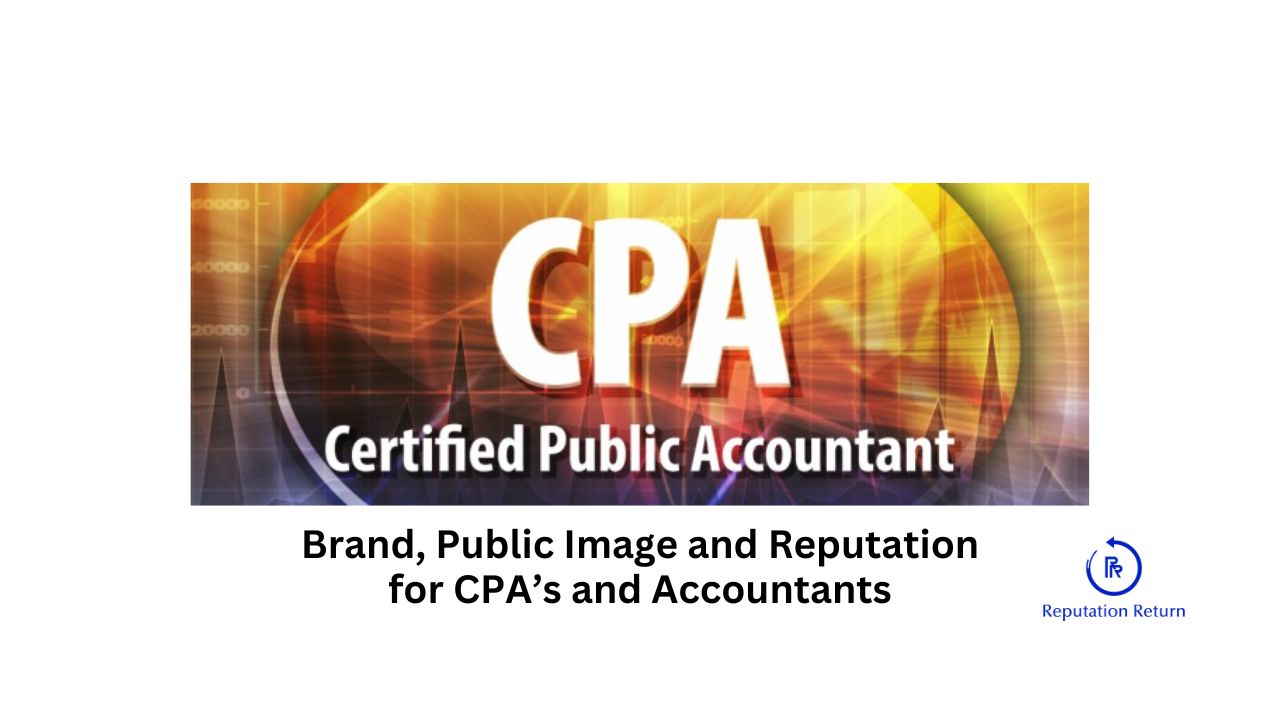In the accounting profession, personal branding, public image, and reputation management are critical components of success. For Certified Public Accountants (CPAs) and accountants, these elements help establish trust, attract clients, and differentiate themselves in a competitive market. Let’s explore the specifics of each and why they are crucial for an accountant’s business success.
Personal Branding for Accountants and CPAs
Personal branding refers to the practice of marketing oneself and one’s career as a brand. For accountants and CPAs, personal branding involves showcasing unique skills, expertise, and professional values.
Key Components of Personal Branding:
- Expertise and Specialization:
- Highlighting areas of specialization, such as forensic accounting, tax preparation, or financial consulting, can set a CPA apart. For instance, a CPA specializing in estate planning can brand themselves as the go-to expert for complex inheritance and tax issues.
- Professional Certifications:
- Certifications like CPA, CMA (Certified Management Accountant), and CFA (Chartered Financial Analyst) are essential in building a strong personal brand. These credentials signal competence and dedication to potential clients.
- Thought Leadership:
- Publishing articles, speaking at industry conferences, and maintaining a professional blog or LinkedIn presence are effective ways to establish thought leadership. For example, an accountant writing about the latest tax law changes can position themselves as an industry expert.
- Client Testimonials and Case Studies:
- Positive client feedback and detailed case studies of past successes can reinforce a personal brand. Sharing stories of how they saved clients money or resolved audit issues can build credibility.
Public Image for Accountants and CPAs
Public image is the perception of an individual by the public. For CPAs and accountants, maintaining a positive public image involves consistent professionalism, ethical behavior, and visibility in the community.
Key Elements of Public Image:
- Professionalism:
- Always demonstrating professionalism in interactions, from client meetings to online communications, is crucial. This includes timely responses, dressing appropriately, and maintaining a courteous demeanor.
- Community Involvement:
- Engaging in community service and participating in local business associations can enhance an accountant’s public image. For example, offering free tax preparation services for low-income families during tax season can build goodwill.
- Media Presence:
- Being featured in local news stories about financial literacy or participating in radio shows as a financial expert can boost visibility and positive public perception.
- Online Reviews:
- Encouraging satisfied clients to leave positive reviews on platforms like Google My Business and Yelp helps manage public image. Negative reviews should be addressed promptly and professionally to demonstrate commitment to client satisfaction. Learn about review management for CPA’s.
Reputation Management for Accountants and CPAs
Reputation management involves actively monitoring and influencing how an accountant or CPA is perceived by others, particularly in the digital space.
Key Strategies for Reputation Management:
- Monitoring Online Presence:
- Regularly checking mentions on social media, review sites, and industry forums is essential. Tools like Google Alerts and social media monitoring software can help track what is being said about the accountant or firm.
- Crisis Management:
- Having a plan in place to address negative publicity or client complaints is vital. Swiftly responding to and rectifying any issues can mitigate damage. For example, if a mistake in a tax filing leads to a client’s complaint, publicly acknowledging the error and taking corrective action can preserve reputation. Learn about our reputation crisis management for accountants.
- Content Creation:
- Creating valuable content such as informative articles, FAQs, and video tutorials can enhance reputation. This content demonstrates expertise and a willingness to educate clients, reinforcing trust and reliability.
- Ethical Standards:
- Upholding high ethical standards is non-negotiable. Any involvement in unethical practices can severely damage reputation. Adhering to professional codes of conduct and continuously engaging in ethical behavior ensures long-term reputation health.
Importance of These Elements for Business Success
Why Personal Branding, Public Image, and Reputation Management Matter:
- Trust and Credibility:
- Trust is the cornerstone of the client-accountant relationship. A strong personal brand, positive public image, and a well-managed reputation collectively build this trust, making clients feel secure in their financial dealings.
- Client Retention and Acquisition:
- A reputable accountant attracts and retains clients more effectively. For instance, a CPA known for their integrity and expertise is more likely to receive referrals and repeat business.
- Competitive Advantage:
- In a saturated market, standing out is crucial. Effective personal branding and reputation management can provide a competitive edge, making an accountant or firm the preferred choice over others.
- Crisis Resilience:
- Proactive reputation management equips accountants to handle crises gracefully, minimizing potential damage. For example, having a protocol for addressing online criticism can prevent it from escalating and affecting the business negatively.
So, for accountants and CPAs, personal branding, public image, and reputation management are integral to professional success. By strategically managing these elements, accountants can build a robust and trustworthy presence, ensuring long-term business growth and client satisfaction.
Are you unsure of which service will work best for you? Ask here >>>

